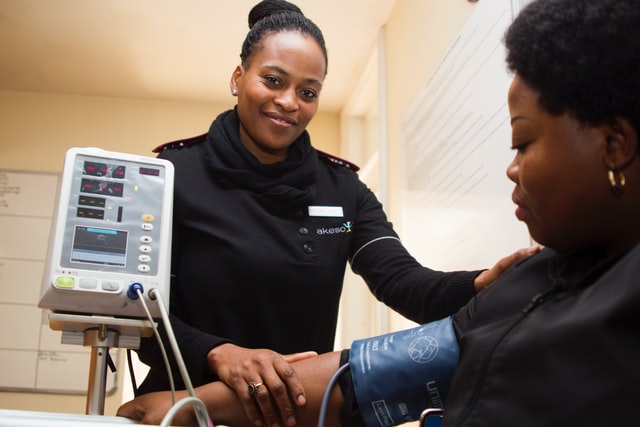Top 13 Traits of a Good Nursing Practitioner

Any vocation within the medical industry can be a demanding one. Nurses perhaps are the epitome of empathy, grit and devotion within the medical field. A permanent nursing career as a nurse should not be entered into lightly, as the job is demanding and often exhausting – both mentally and physically. However, the nurses that love their job and strive to help others for a living are everyday heroes worthy of praise. (Image Credit: Hush Naidoo/Unsplash)
A nurse becomes part of the community in which they work, especially if they do not operate in private establishments. These highly skilled nurses are often those that go beyond their call of duty and provide the best possible care for the patients they deal with daily. If you are considering entering into the nursing sector, or are already a part thereof, there are ten personal traits which can be built upon in order to survive the grueling hours a nursing job demands. Let’s explore these traits.
Passion for People
It certainly is true that if one embodies the spirit of a humanitarian, the passion for people exists from a very young age. Being concerned for the welfare of human beings as well as having true empathy for others is probably the best personal trait of a nursing practitioner. We aren’t all born with this trait, but one can work on understanding and acceptance if you fall short in the empathy department.
Good nurses have a deep respect for human life and do their best to embody this trait.
Nurses do not judge patients by any of the following:
- Sex
- Age
- Race
- Status
- Affordability
- Weight
Instead, they treat each patient with dignity and respect.
Good Understanding of Community
Often, nursing practitioners are part of the very fabric of the community they operate in, and therefore a keen understanding of the community in which they serve is essential. Knowing how a community responds to crises or developments within an area goes a long way to serving that community effectively.
Nurse practitioners are often met with members of the community who require assistance from those around them, and knowing how to approach these situations can be beneficial to the wellbeing of the entire community. Being able to identify specific problems and solutions within a specific community can also enable the nurse practitioner to be adequately prepared for a full day of work.
Desire to Learn
Advances in medicine are always in motion, and being up to date with such information can arm a nurse with the necessary skills to better serve their community. Constant upskilling is a necessary trait for successful nurses within poorer communities especially. Recent nursing trends, according to Carson-Newman, indicate that the importance of higher education degrees serves the community directly, as lower mortality rates are experienced. Quality education is incredibly important.
This education comes from two sources:
- Formal study, which forms an essential base from which to build from
- Learning from peers which expands the knowledge and experience of new nurses quickly.
The lack of experience in nursing, especially for new graduates, should be motivation enough to learn as much as possible from nurses who have been in the field for years. Therefore, setting aside ego is equally as important as the innate desire to learn and absorb new information. Inexperienced nurses who want to be the best in their field should also understand that being a good nurse is more than just possessing the technical skills, but also includes a good understanding and application of soft skills too.
Adaptability
This personal trait is highlighted because the ability to adapt to a situation is crucial within the nursing industry. Often the profession demands critical thinking and problem-solving which relies heavily on the nurse’s ability to adapt to circumstances, the immediate environment and stress. Adaptability also extends to the ability to embrace change which can serve a nurse practitioner particularly well if they intend on moving up in rank. Stubbornness does not serve the medical industry well and this extends to the nursing sector.
Ability to Function Under Pressure
Functioning adequately under pressure goes together with adaptability, as both are closely linked. Often, nursing is demanding, and in times of a crisis or emergency, nurses are expected to function well in such situations. Being able to function in emergency situations and being able to adapt quickly to these situations are a great combination of personal traits.
On any given day, nurses might face:
- Life-or-death medical emergencies
- Patients who stop breathing
- Patients who suffer heart attacks
- Stroke victims
- Excessive bleeding from wounds
Similarly, time management also falls into the trait of working under pressure. Being cognizant of which matters should be prioritized and how many matters need to be attended to can alleviate stress and mistakes in pressured environments.
Positive Outlook
The medical industry can at times feel depressing, especially when mortality rates play a part in this. The ability to remain positive in such times can both benefit the nursing practitioner and the patients as negativity is a breeding ground for depression.
Open to Criticism
Naturally, if you work with people, you open yourself up to criticism. This is especially true when nurse practitioners are operating in communities that serve older people. Of course, there exists a balance of absorbing constructive criticism and brushing off the overly negative critics. Often people will complain just for the sake of complaining, which should always be ignored.
Occasionally, nurses are subjected to harsh criticism by doctors, surgeons or specialists, but seasoned nurses will be able to not take such criticism personally and rather look for a lesson in these circumstances. Having a thick skin is indeed helpful in the nursing profession, especially in hospital and surgery environments.
Health Conscious
Being a nurse requires physical stamina as the hours are often long and most of these hours are spent on one’s feet. Keeping fit and healthy is a crucial trait within the nursing profession. In the same breath though, over-exerting yourself unnecessarily will also lead to burn-out or chronic fatigue.
Nurses who have been in the profession long enough will have found the balance between activity, rest and recuperation. Looking after your mental, emotional and physical health is of extreme importance. A good nurse cannot treat patients effectively if they feel sluggish, worn out or irritable. Balance is key.
Diligent Communicator
A nurse practitioner does not have to be an extrovert in order to be deemed a good nurse, but good communication skills are vital.
Nurses are often responsible for communicating with many different people:
- Patients
- Doctors
- Surgeons
- Family of patients
- Suppliers and vendors
- Delivery people
Good communication is part and parcel of the profession. Clear communication benefits the entire ecosystem of the nurse-patient setup. Mistakes and miscommunication can be hazardous in medical situations; therefore, nurses should be able to communicate properly with those around them.
Ability to Debrief
One of the most important traits of a good nurse is the ability to debrief, especially after seemingly traumatic events. Unfortunately, it is not uncommon for nurses to experience the death of a patient or be involved in trauma cases. In order to process negative emotions and overwhelming feelings of grief or shock, nurses need to find constructive ways of debriefing after such events. This process enables them to continue to serve their patients effectively and to avoid the symptoms of post-traumatic stress disorder. The process of debriefing also adds to the understanding of the profession as well as a healing technique.
Attention to Detail
Nurses aren’t expected to be perfectionists, but they come pretty close, especially in stylish nursing scrubs. An acute awareness of details serves nurse practitioners particularly well, especially if they are dealing with difficult cases. Even the most minor of details can impact a treatment plan or diagnosis and can, therefore, provide the patient with the best level of care one would expect from a medical professional.
Commitment
Unwavering commitment and determination are traits that set a good and a great nurse apart. The physical and industry demands within the nursing profession are not suited to everyone, which is why nursing requires unwavering commitment from those who work in the field. Nursing often requires long hours, physical exertion, and presence of mind at all times, which can fast become exhausting for most people. The best kinds of nurses are those who don’t complain about these demands and continue to provide only the best they possibly can for their patients.
Promotion of Health
Good nursing practitioners have an uncanny way of being able to promote good health practices even when they aren’t on the clock. Those who go above and beyond their call of duty may even set up information sessions for community members to attend or take a roadshow approach to local schools and healthcare facilities in their area.
Mature nurses are usually great mentors for those that are only starting out in the nursing profession or for those who feel they could benefit from the advice and encouragement of those that have walked miles in their proverbial shoes. Personality traits and self-awareness are usually acquired through genetics and at times through environmental exposure. If this is true, then it is also possible that certain traits can be acquired or at least improved upon. Being cognizant of the traits above can help nursing practitioners better manage their day to day tasks as well as treating patients and working alongside colleagues.











Leave a Reply